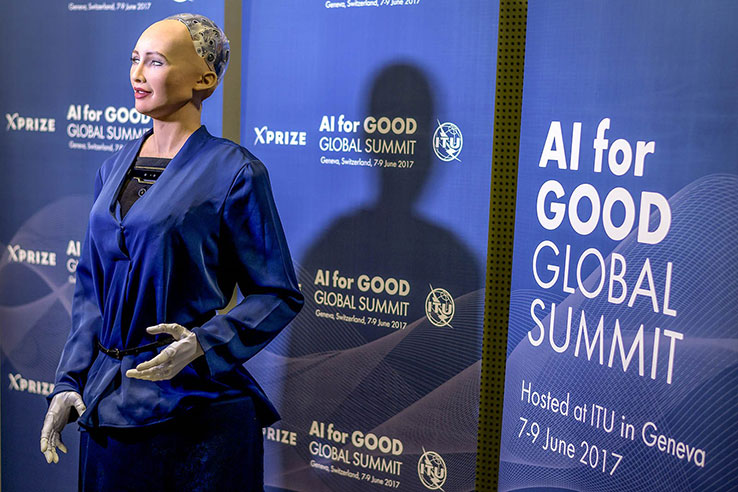Sabin Selimi
 To get AI right, we need stronger cooperation between state institutions—governments, law enforcement agencies, the judiciary and parliaments—private sector, academia, civil society and the public at large.
To get AI right, we need stronger cooperation between state institutions—governments, law enforcement agencies, the judiciary and parliaments—private sector, academia, civil society and the public at large.
Expect artificial intelligence (AI) to make dramatic changes to societies in the new decade or so, going beyond anything dreamed up during previous technological revolutions. The public discourse over the effects of AI has been led mostly by the fear of it exceeding human intelligence and getting out of hand, as well as by the concern that the new intelligent machines will replace humans in every aspect of life, from driving cars to diagnosing diseases and more. But AI will also have a profound impact on the future global politics. It will offer governments an opportunity to annex the digital realm, providing an alternative to open political systems.
AI in the name of national security
The last decade has seen countries drag AI into their orbit, justifying it in the name of national security. Nowhere has this been more conspicuous than in China, where a more controversial development is taking place. The authorities in Beijing are using AI to build an Orwellian state and have already begun to build a system using machine learning and surveillance tools to control its own citizens within its own boundaries. Beijing will be able to censor certain topics and behaviors in order to allow the free flow of information for economically-productive activities, while limiting or eliminating anything that might do damage to the authorities and the system itself. Also, AI is as good as the data it has access to and as such it will allow predictive control of potential opponents to the system, which will resemble consumer targeting of Google and Amazon but will be more sophisticated and effective, allowing the authorities to draw on data in ways that have been undreamed of. All this provides an early indication of a draconian digital future.
But there is also growing interest in AI technology by law enforcement and national security agencies around the rest of the world. The proliferation of AI technology in national security matters is likely to increase the frequency of episodes such as the scandal in Mexico that uncovered their government’s surveillance of journalists using a malware. Just recently, in the southeastern corner of Europe, the Chinese Huawei’s safe city project in Serbia’s capital Belgrade, which intends to install cameras with facial and license plate recognition capabilities in hundreds of locations across the city, caused a national outrage, arguing that such surveillance tool powered by AI technology will offer the Serbian government a way to curb political dissent. While this can be a powerful tool for law enforcement officials for finding suspected criminals or terrorists, it can also turn into a weapon to control people. For foreign-policy makers, these cases signal an intensification of the “Snowden contradictions” and a need to protect privacy and communication rights of media and civil society in illiberal democracies.
AI and the balance of power on the world stage
AI will also impact balance of power on the world stage. For the past several decades, the balance of global power has been maintained with nuclear deterrence among the nuclear-armed countries. Now there is a potential that AI brings to advance security interests, triggering a heated race among countries to gain a strategic advantage. Countries are already working to develop AI-powered weapons that would enhance battlefield capabilities while exposing fewer boots on the ground to injury or death. China’s national AI strategy shows how seriously governments take this new technology, placing major bets on the future of AI. In a speech three years ago, Russia’s President Vladimir Putin said that the country that gains an edge in AI technology “will be the ruler of the world.”
 Source: brinknews.com
Source: brinknews.com
The way AI will be used can have serious consequences in global politics, especially if a certain country has greater capabilities than the other, which, as a result, can potentially change the balance of power. Challenges to a particular region’s balance of power may occur as some countries drag AI technology into their orbit to reverse historic strategic disadvantages vis-à-vis their neighbors. Few countries will be able to afford to pursue AI responsibly on the military battlefield, since not all will do so as they may be putting themselves at a strategic disadvantage vis-à-vis another country by doing so. For instance, there is no approach to ethical questions related to such weapons in the Chinese discourse. Russia’s arms manufacturers have announced plans to develop AI-powered weapons such as missiles and small arms. The global institutions and treaties that ensure peace and stability in the international system were never intended to apply to a system incorporating AI. Yet a new consensus between the United States, the European Union, China, Russia and other rising AI powers on specific norms will be crucial to controlling an impending AI-powered weapons race.
AI and non-state actors
In many respects, the securitization of the digital realm has been a natural global development with the rising prominence of non-state actors in the 21st-Century international system. Terror groups and criminal organizations seeking to commit immoral acts and inflict chaos within societies have utilized digital tools to further their objectives in unconventional ways.
The greatest threat from AI-powered weapons is not limited to countries. The threat will come from non-state actors if they fall into their hands, which implies an increasing asymmetry between national militaries and terrorist groups and criminal organizations going forward in some aspects of future warfare. Non-state actors and countries in the future will be able to fight virtual battles between forms of AI seeking to deactivate one another with malicious code or disinformation. With populism already on the rise and nationalist politics enjoying resurgence, AI may be used to target certain groups of people to rely on false information or oppose their own interests with great intended impact, threatening the integrity of democratic discourse and the reputation of state institutions.
The way forward
To get AI right, we need stronger cooperation between state institutions—governments, law enforcement agencies, the judiciary and parliaments—private sector, academia, civil society and the public at large. The task is daunting, but not impossible. States should make sure that the private sector, which bears the responsibility for the design, programing and implementation of AI technologies, upholds human rights standards. States should also invest in public awareness-raising and education initiatives to develop the competencies of all citizens and particularly target the youth, to engage positively with AI technologies and better understand their impact.
The new technological revolution will pose serious challenges to the notion of consolidating democratic institutions and social equity, since surveillance practices powered by AI technologies can constrain civil rights and liberties. It is the domain of international diplomacy to communicate the responsible use of AI with the rest of the world. One should consider whether the use of AI means smarter and innovative governments or mass surveillance and crumbling democracies? The truth of the matter is that it is currently unclear, which is both worrying and exciting. The proliferation and development of AI and access to big data in the new era present a moral maze for governments around the world.


